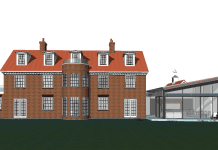Human Nature, the company behind the planned mass timber structure neighbourhood, was founded by former Greenpeace directors Michael Manolson and Jonathan Smales
Known as the Phoenix, the mass timber structure neighbourhood project will transform a former industrial site in Lewes, East Sussex by creating sustainable community spaces and 685 homes across a riverside estate.
Aiming to reflect the housing needs of the local area, the vast majority of homes will be apartments, particularly aimed at young people, young families, and older people who are looking to downsize.
A sustainable, community-based urban design
The Phoenix will introduce new types of homes to Lewes, taking influence from European courtyard apartment housing to promote shared living.
These will be mostly one-bedroom (37%) and two-bedroom homes (33%), with some three (24%) and four bedroom homes (6%).
There will be up to 210 affordable homes, or 30% of the total number, which will be designated as either First Homes or affordable rent (including 92 Lewes Low-Cost Housing).
Steering away from private vehicle ownership
The Phoenix will offer a co-mobility hub with electric car share, hire and club, along with a shuttle-bus facility and electric bike service to remove reliance on private vehicle ownership.
Renewable energy on a data-led grid and energy-efficient design will also save homes on the estate around 10-20%, wiht heating bills in particular up to 80% lower than in traditional developments.
Sustainable, cohesive design are prioritised throughout the mass timber frame neighbourhood

Referencing the site’s brownfield past, where possible existing materials such as cladding, steel trusses, bricks and buttresses will be salvaged and repurposed or reconstituted.
Prefabricated cassettes made from local timber and biomaterials such as hemp will be used in the engineered timber structures, all within what Human Nature calls a ‘Raw & Craft’ approach.
This is a design principle that steers priority towards strength, adaptability and quality of ‘raw’ materials over elaborate finishes and fit-outs. The ‘craft’ element does not refer to pricey items made by artisans but individual expression of the occupant. Human Nature offers a list of approved local contractors, decorators, and other tradespeople to support this approach.
Coherence and consistency in a sustainable development
This is part of the Design Code submitted with the planning application, which will “control the overall character and appearance of the development to deliver consistency and coherence” as each phase of the development is delivered.
Jonathan Smales, founder and CEO of Human Nature, said: “The current mainstream model of development is catastrophic, baking in deeply unsustainable fabric, infrastructure and transport, fuelling the climate and nature crises; it also creates social divisions and exacerbates loneliness.
“We aim to show that living sustainably can be a joy, not an exercise in self-denial, made far easier by the design of neighbourhoods.”

















